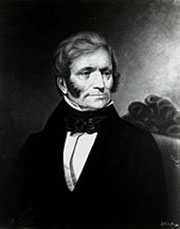 The town of Forsyth came into existence in 1822 after the new county of Monroe was created. The town was incorporated and made the county seat by an act of the General Assembly, December 10, 1823. The following pioneer residents were named as commissioners: James S. Phillips, Henry H. Lumpkin, John E. Bailey, Anderson Baldwin, and Samuel Drewry. Land for the city was purchased from John T. Booth, on February 18, 1823, for the sum of $700 for his 202 ½ acre land lot, number 171. The town was laid off into lots of two and one-half acres each, which afforded ample room for garden plots and spacious green lawns. The city limits consisted of a circular area with a radius of ½ mile from the courthouse square. By 1827, Forsyth contained 70 houses and stores, an academy, a house of worship for Baptists, and an elegant courthouse and jail. The first brick store in Forsyth was built by Cyrus Sharp. The first courthouse was built of logs.
The town of Forsyth came into existence in 1822 after the new county of Monroe was created. The town was incorporated and made the county seat by an act of the General Assembly, December 10, 1823. The following pioneer residents were named as commissioners: James S. Phillips, Henry H. Lumpkin, John E. Bailey, Anderson Baldwin, and Samuel Drewry. Land for the city was purchased from John T. Booth, on February 18, 1823, for the sum of $700 for his 202 ½ acre land lot, number 171. The town was laid off into lots of two and one-half acres each, which afforded ample room for garden plots and spacious green lawns. The city limits consisted of a circular area with a radius of ½ mile from the courthouse square. By 1827, Forsyth contained 70 houses and stores, an academy, a house of worship for Baptists, and an elegant courthouse and jail. The first brick store in Forsyth was built by Cyrus Sharp. The first courthouse was built of logs.
Forsyth experienced intensive commercial growth between the mid 19th and early 20th centuries. This growth was brought to the area by the arrival of the railroad in 1838 (Forsyth is home to the first passenger rail service in Georgia), 19th century cotton agriculture (farming and 2 cotton mills), and the opening of Tift College in 1849 (2nd oldest founded female college in the world).
Forsyth was named in honor of John Forsyth who was an eminent American political leader born in Fredericksburg, Virginia. He graduated from Princeton in 1799 and was admitted to the bar in 1802. He served in the U.S. House of Representatives (1813-18) and the Senate (1819-19). From 1819-1823, Forsyth was U.S. minister to Spain and gained the Spanish king's ratification of the treaty of 1819 ceding Florida to the United States. Again he served the U.S. House of Representatives from 1823-1827. During the period from 1827-1829 he was governor of Georgia. His career continued as he once more entered the U.S. Senate from 1829-1834. A final political service was from 1834-1841 as Secretary of State.
(Quoted from "Monroe County, Georgia A History" published by the Monroe County Historical Society, Forsyth, Georgia)
